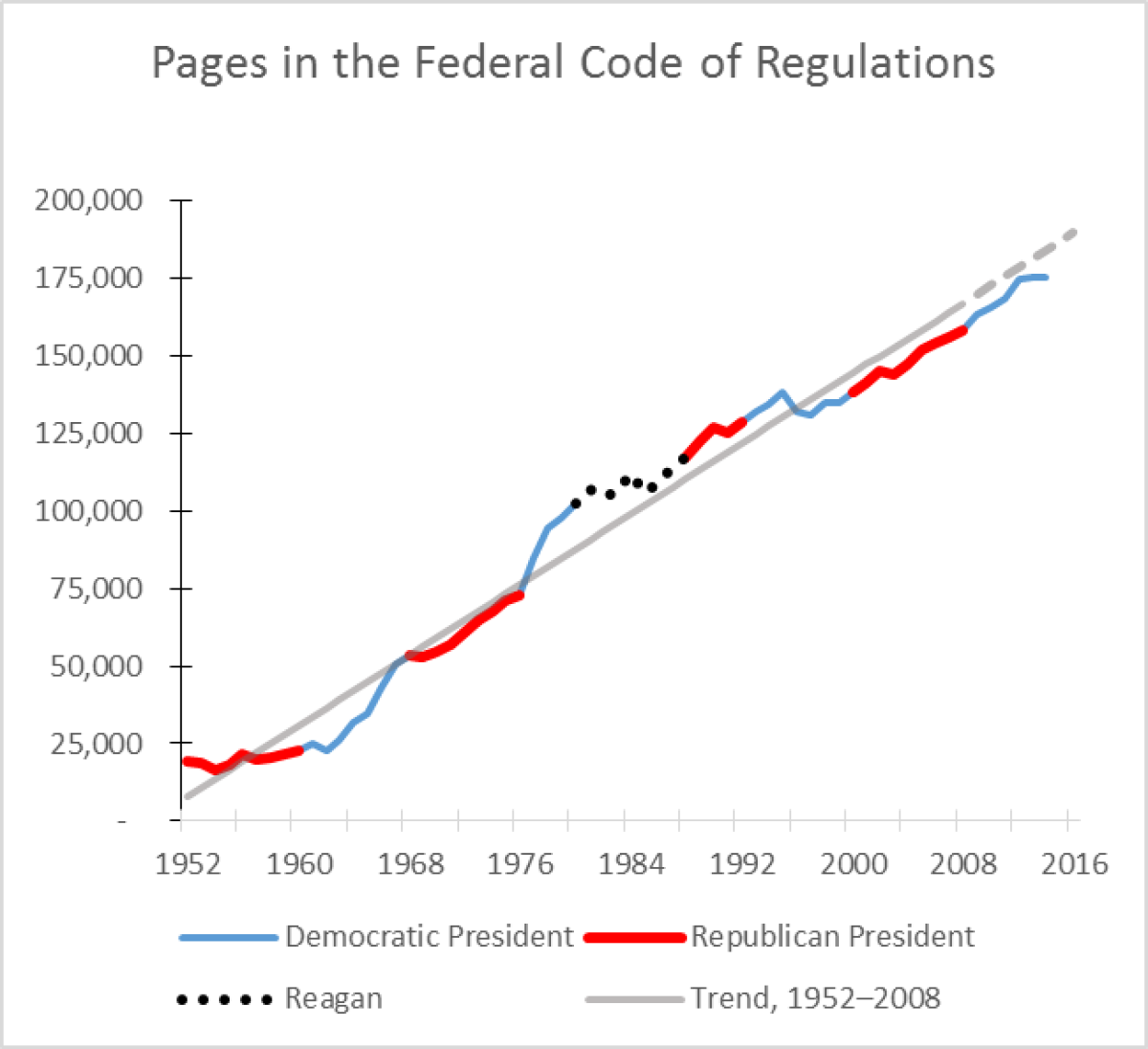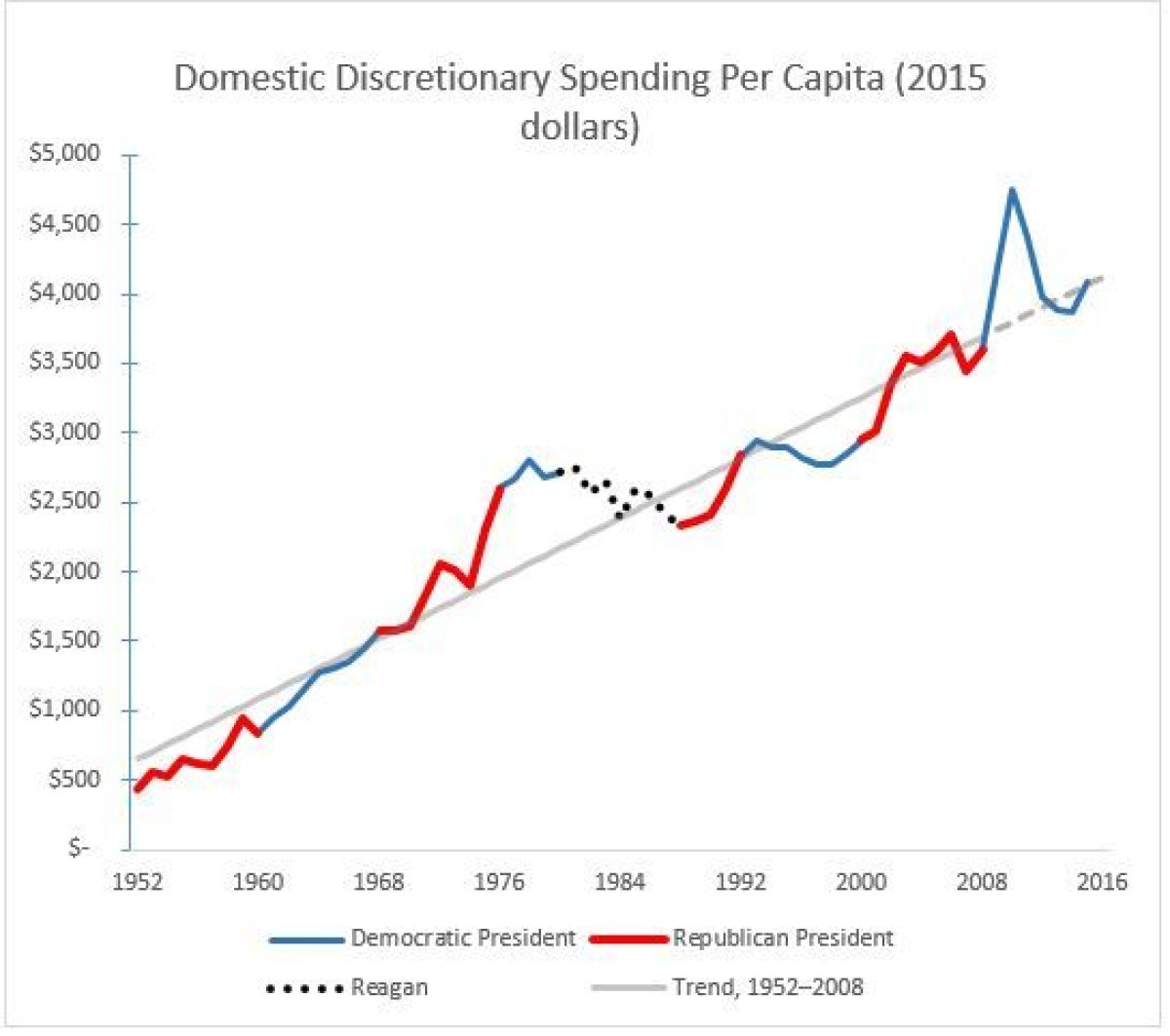
This article first appeared on the American Enterprise Institute site.
Conservatives who plan to vote for Donald Trump say that Hillary Clinton is so awful that anybody, even Trump, is preferable.
Without getting into the comparative defects of Clinton and Trump (disclosure: I'm #NeverTrump), I think it's useful to remind everyone of the ways in which having a Republican president hasn't made all that much difference for the past 50 years, with Ronald Reagan as the one exception.
First, here's the history of the most commonly used measure of growth in the regulatory state, the number of pages in the Federal Code of Regulations.

We can fairly blame Lyndon Johnson's Democratic administration for the initial spike in regulations, and Jimmy Carter's years saw another steep rise. But using number of pages as the measure understates what happened during Richard Nixon's years, when we got the creation of the Environmental Protection Agency and the Occupational Safety and Health Administration, plus much of the legislation that gave regulators the latitude to define terms such as clean or safe as they saw fit.
After the Carter years, the slope of the trend line was shallowest in the Reagan and Clinton administrations (with the Clinton result concentrated in his second term, when a Republican House imposed a moratorium on some new regulations).
The increase during the Barack Obama years remained on the same slope as the one during George W. Bush's years. And if you're thinking about the Democrats' most egregious regulatory excess, Dodd-Frank in 2010, recall that Sarbanes-Oxley passed in 2002, when Republicans controlled both the House and the Senate.
I should add that presidents don't bear a lot of blame for failing to reduce regulation—their power to restrain the activities of the regulatory agencies is limited—but neither has electing a Republican president done any good, with Reagan as a partial exception.
Turning to federal spending, we have to remember that presidents can't do anything unilaterally to cut entitlements that are already on the books, nor do most Republicans want their presidents to cut defense spending. That leaves discretionary domestic spending.
Using the Bureau of the Budget's historical budget table 3.1, I added up the line items for Education, Training, Employment and Social Services; Health (which doesn't include Medicare); Income Security; Energy; Natural Resources and Environment; Transportation; Community and Regional Development; General Science, Space, and Technology; and Agriculture. I converted the totals for 1952–2016 into constant 2015 dollars of spending per capita. Here's the result:

The Kennedy-Johnson years saw many new social programs, but the rise in per capita spending was only slightly higher than during the Eisenhower administration. The big spike in discretionary domestic spending occurred on Nixon's watch.
The graph gives Carter too much credit—the only reason his years show flat spending in constant dollars is that large nominal increases were swallowed by high inflation.
Then come the two presidents who bucked the trend and kept domestic spending under control: Reagan, of course. Real per-capita discretionary domestic spending decreased, even though inflation after the first few years of his administration was low.
And the second? Bill Clinton, throughout his eight years. Discretionary spending went up under both Bushes. If the cost of George W. Bush's Medicare prescription drug entitlement is included, the rise during his administration would be even worse.
As for Obama, he did indeed waste a huge amount of money on TARP and other failed stimulus programs during the depths of the Great Recession, but by 2012 his administration's budgets for discretionary domestic spending were back on the trend line established by his predecessors from 1952 to 2008.
None of this is intended to say that the increases in regulation and in spending over the past half-century have been acceptable. They are the traces of a metastasis in federal power that in my view has gutted the American project.
Nor is any of this intended to say that presidential elections don't make any difference. But amid the wringing of Republican hands about the awful things that will happen if Clinton is elected, a little historical perspective may lower the GOP's blood pressure just a bit.
And Republicans might want to reflect on what Trump's rhetoric portends for both trend lines in a Trump presidency.
Charles Murray is the W.H. Brady Scholar at the American Enterprise Institute. He first came to national attention in 1984 with the publication of Losing Ground, which has been credited as the intellectual foundation for the Welfare Reform Act of 1996. His 1994 book, The Bell Curve, co-authored with the late Richard Herrnstein, sparked controversy for its analysis of the role of IQ in shaping America's class structure. Murray's other books include What It Means to Be a Libertarian (1997), Human Accomplishment (2003), In Our Hands (2006), Real Education (2008) and Coming Apart (2012). His most recent book, By the People: Rebuilding Liberty Without Permission. urges Americans to stem governmental overreach and use America's unique civil society to put government back in its place.
Uncommon Knowledge
Newsweek is committed to challenging conventional wisdom and finding connections in the search for common ground.
Newsweek is committed to challenging conventional wisdom and finding connections in the search for common ground.
About the writer
To read how Newsweek uses AI as a newsroom tool, Click here.








